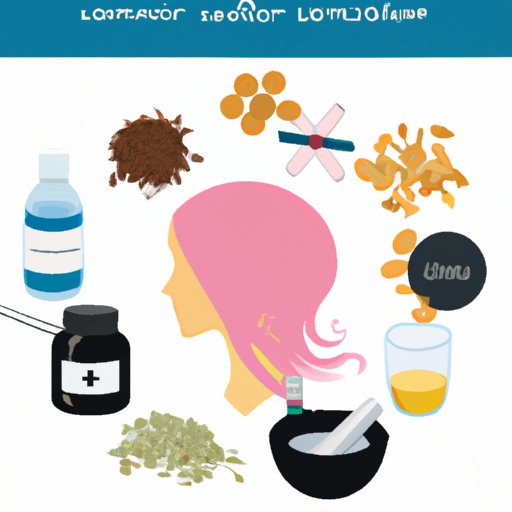Introduction
Chemotherapy is a type of cancer treatment that uses drugs to destroy cancer cells. Unfortunately, chemotherapy can also cause hair loss in some people. Hair loss can be temporary or permanent depending on the type of chemotherapy and the person’s individual response to the drugs. Although hair loss can be emotionally difficult for many people, there are steps one can take to help stimulate hair growth after chemo.
This article will explore the various ways to help with hair growth after chemo, including nutrition and diet changes, natural remedies, vitamins and supplements, stress reduction techniques, and professional treatments. By making these lifestyle changes and utilizing treatments, it may be possible to stimulate hair growth after chemotherapy.
Nutrition and Diet Changes to Support Hair Growth
Making dietary changes is one of the best ways to support hair growth after chemo. Eating a balanced diet full of nutrient-rich foods can help provide the body with the necessary vitamins and minerals it needs to promote healthy hair growth. It is important to note that everyone’s dietary needs are different, so it is best to consult a doctor or nutritionist before making any drastic changes.
Foods that are beneficial for hair growth:
- Leafy green vegetables (spinach, kale, collard greens)
- Salmon and other fatty fish
- Eggs
- Berries
- Nuts and seeds
- Avocados
- Sweet potatoes
- Beans and legumes
Foods to avoid:
- Sugar
- Processed foods
- Alcohol
- Caffeine
- Trans fats
Natural Remedies for Hair Growth After Chemo
In addition to dietary changes, there are also natural remedies that can help with hair growth after chemo. These remedies include herbs and essential oils, as well as massage techniques.
Herbs and essential oils:
- Rosemary
- Peppermint
- Lavender
- Thyme
- Cedarwood
- Jojoba oil
- Olive oil
- Coconut oil
These herbs and essential oils can be used in a variety of ways, such as adding them to an oil blend, using them in shampoo and conditioner, or massaging them into the scalp. It is important to note that essential oils should always be diluted before use.
Massage techniques:
Scalp massages can help improve blood circulation to the scalp, which may help stimulate hair growth. Massaging the scalp can also help reduce stress and anxiety, which can have a positive effect on hair growth. To perform a scalp massage, use circular motions with your fingertips to massage the entire scalp for several minutes.

Vitamins and Supplements to Promote Hair Growth
In addition to dietary changes and natural remedies, taking certain vitamins and supplements may help support hair growth after chemo. Some of the most common vitamins and supplements recommended for hair growth include multivitamins, biotin, iron, and omega-3 fatty acids.
Multivitamins: Taking a daily multivitamin is a good way to ensure that you are getting the necessary vitamins and minerals to promote healthy hair growth.
Biotin: Biotin is a water-soluble vitamin that helps the body convert food into energy. It is also thought to help with hair growth and thickness. Biotin can be found in foods such as eggs, salmon, nuts, and avocados.
Iron: Iron is an important mineral for hair growth. Low iron levels can lead to hair loss, so it is important to make sure you are getting enough iron in your diet. Good sources of iron include red meat, leafy green vegetables, beans, and fortified cereals.
Omega-3 fatty acids: Omega-3 fatty acids are essential fatty acids that are important for healthy hair growth. They can be found in foods such as salmon, flaxseeds, walnuts, and chia seeds.

Stress Reduction Techniques to Help Hair Growth
Reducing stress is another important factor in promoting hair growth after chemo. Stress can have a negative effect on hair growth, so it is important to find ways to manage stress levels. Some stress reduction techniques include meditation, exercise, and relaxation techniques.
Meditation: Meditation is a great way to reduce stress and cultivate a sense of inner peace. There are many different types of meditation, such as mindfulness meditation, guided meditation, and breathwork.
Exercise: Exercise is a great way to reduce stress and improve overall health. Even low-impact activities such as walking and yoga can help reduce stress levels.
Relaxation techniques: Relaxation techniques such as deep breathing, visualization, and progressive muscle relaxation can help reduce stress and promote feelings of calm and wellbeing.

Professional Treatments to Stimulate Hair Regrowth
In addition to lifestyle changes, there are also professional treatments that can help stimulate hair regrowth after chemo. These treatments include platelet-rich plasma (PRP) therapy and low-level laser therapy.
Platelet-rich plasma (PRP) therapy: PRP therapy is a type of treatment that uses the patient’s own blood to stimulate hair growth. During the procedure, a doctor will draw the patient’s blood and then separate the platelets from the other components. The platelets are then injected into the scalp to stimulate hair growth.
Low-level laser therapy: Low-level laser therapy is a type of treatment that uses light to stimulate hair growth. During the procedure, a device is placed on the scalp and emits low-level laser light to stimulate hair follicles and promote hair growth.
Conclusion
Hair loss can be a difficult side effect of chemotherapy, but there are steps one can take to help stimulate hair growth. Making dietary changes, utilizing natural remedies, taking vitamins and supplements, and reducing stress can all help promote hair growth. In addition, professional treatments such as PRP therapy and low-level laser therapy may be beneficial for some people.
Before starting any regrowth program, it is important to speak with a doctor about the best course of action for your individual situation. With the right combination of lifestyle changes and treatments, it may be possible to stimulate hair growth after chemotherapy.


